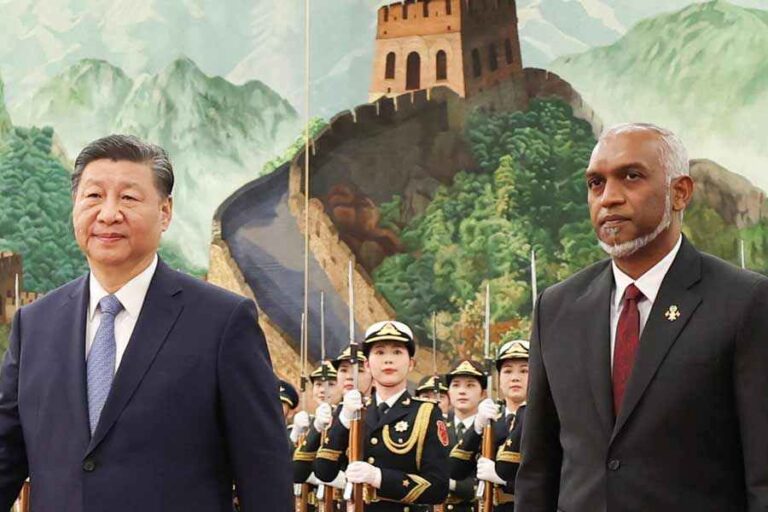News Desk, Kolkata : Recently, the President of Maldives, ‘Mohamed Muizzu’, returned from his five-day visit to China, expressing praise for the friendship between the two nations. ‘Mohamed Muizzu’ highlighted the mutual respect China shows for Maldives’ sovereignty, fostering a strong bond between the two countries. This relationship dates back to 1972 when bilateral ties were established, and since then, China has been actively supporting Maldives in its development.
In November,Mohamed Muizzu assumed the role of President of Maldives, emphasizing the importance of China-Maldives relations even before his election. His support for China has been evident in various ways, including expressing admiration for China’s Belt and Road Initiative (BRI), which has contributed to the progress of Maldives. Muizzu believes that China, as a friend, will never interfere in the internal affairs of Maldives, creating a robust and amicable relationship.
Muizzu’s positive sentiments extend beyond China’s government to its President, Xi Jinping. In a recent interview, Muizzu commended Xi Jinping as a leader who prioritizes the well-being of Chinese citizens. He acknowledged Jinping’s effective leadership, attributing China’s economic success to his policies. Muizzu’s remarks reflect a deep appreciation for China’s political stability and economic growth under Jinping’s guidance.
Interestingly, Muizzu’s stance on China has raised eyebrows, especially considering the strained relations between Maldives and India. Even before assuming office, Muizzu’ hinted at recalibrating the military presence of Indian forces in Maldives, advocating for a more independent foreign policy. His statements have sparked discussions about the unique balance he aims to achieve between China and India, two influential neighbors in the region.
Adding another layer to the narrative is Maldives’ participation in China’s Belt and Road Initiative, showcasing their commitment to enhancing economic ties. Muizzu sees this initiative as a catalyst for Maldives’ progress and has expressed optimism about future collaborations that will further strengthen the relationship.
In the context of regional dynamics, Muizzu’s approach marks a departure from the previous administration’s alignment with India. The President’s emphasis on non-interference from China in Maldives’ internal affairs, coupled with his praise for Jinping’s leadership, underscores a strategic shift in diplomatic priorities.
As Muizzu returned from his China visit, he extended greetings to the leaders of India on their 75th Republic Day, showcasing an attempt to maintain diplomatic equilibrium. However, tensions have surfaced with India, particularly regarding Prime Minister Narendra Modi’s visit to the Maldives. Some Maldivian ministers criticized Modi’s trip, leading to the hashtag #BoycottMaldives trending on Indian social media.
The tourism sector in Maldives has also faced repercussions, with cancellations of multiple bookings from India, impacting the nation’s economy. This highlights the delicate balance Muizzu’ seeks to maintain between India and China, navigating the complexities of regional geopolitics.
In conclusion, President Mohamed Muizzu approach to foreign relations, particularly with China, has added a new dimension to Maldives’ geopolitical landscape. His praise for China’s leadership, participation in the Belt and Road Initiative, and recalibration of ties with India underscore a nuanced strategy that aims to leverage partnerships for Maldives’ development. The evolving dynamics in the region suggest that Muizzu’s presidency will play a crucial role in shaping the nation’s foreign policy in the coming years.
DISCLAIMER
Our news media denounces any form of bias and disapproves of sensationalism. The disseminated news is entirely educational and aimed at social awareness. Our media maintains absolute impartiality, adhering solely to the purpose of education and social consciousness.


